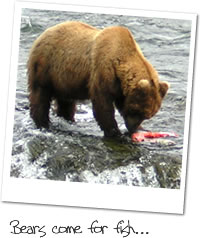Alaskan redbreasts

Direct link to this page: https://www.hayadan.org.il/alaska170903.html
Kaktuvik, Alaska
Skeptics who do not believe in global warming are invited to visit this Eskimo village on the edge of the Arctic Ocean, about 400 km north of the Arctic Circle. It's hard to be smug about the issue of climate change when you're in an area that usually houses animals like polar bears and gluttons (a carnivore from the weasel family) and now attracts red-breasted animals (which in the Inupiat language of the Eskimos living here don't have a name at all). One of them built a nest this year in this town. Last year even a hedgehog came here, probably shivering with cold.
The Oakfilk River Valley has always been too cold and dry for a river meadow. Okfilak in the Inupiat language means "river without guarantee". Today, due to the warming of the weather and the increase in humidity, it is full of grass. The warming ocean also brought here salmon fish that were not here a generation ago.
"The weather is different," says 92-year-old Nora Agiak, who spoke the Inupiat language and wore moccasins made of deer skin and a suit made of gregen fur. "There are fewer glaciers here than in the past."
In the past I was skeptical of the demands - such as those included in the Kyoto Protocol - to invest a lot of money in dealing with climate change. But I'm changing my mind. More and more evidence is accumulating, according to which the emission of carbon as a result of human activity causes an accelerated warming of the earth, and this constitutes a significant threat to the world.
In the last 30 years, Alaska has warmed by 8 degrees on average during the winter. The "American Committee for the Study of the Arctic Region" states that the temperatures prevailing today in the region are the highest in the last 400 years, and perhaps even more.
The U.S. Navy reports that in the areas where its submarines pass, the volume of Arctic ice has decreased by 42% in the last 35 years, and the average thickness of the ice below the surface of the water has decreased by 1.29 meters. The "Office of Naval Research" warns that the summer Arctic ice cap may disappear completely around 2050
"There is climate change," says Robert Thompson, a local guide, unequivocally. He points out that the ice that used to float close to the coast and was a haven for polar bears, retreats sometimes hundreds of kilometers north of Kektovik. This caused several bears to drown, and others to be stranded on land (after a polar bear was spotted outside the Kaktovik post office one snowy morning, residents explained what to do when you encounter a starving polar bear: shout and throw rocks, and above all, don't run!)
The runway of Kaktovik, which has existed for 50 years, began to be flooded due to the rise in sea level, and they are considering moving it to a higher site. The residents of the Iskim village of Shismaraf voted in favor of moving it to another location due to the rise in sea level. The residents of the area say that the winters have become much warmer.
That may not sound so terrible, but while there are benefits to a warmer Alaska (longer agricultural growing season, ice-free ants), climate change could also damage crops, spread tropical diseases, and turn Bangladesh into a permanently flooded region. The rate of warming may be so fast that animals, humans or ecosystems cannot adapt to it.
The intergovernmental panel discussing climate change, reflecting a consensus of scientists, concluded that human activity probably caused most of the warming in recent decades. He predicted that in this century the sea level would rise by 10 to 87.5 cm.
About 14 years ago, a warming phenomenon probably caused a 21-meter rise in sea level, in just a few hundred years. Today's computer models do not predict a similar increase, but they also cannot explain why things happened then.
This is the reason why I am changing my mind about the need to take significant steps to address carbon emissions. Global warming is still an uncertain threat, but it could become one of the greatest challenges of the century. There is no doubt that our government must do more in this regard than censor discussions about climate change in EPA (Environmental Protection Agency) reports. If we don't act soon, we could see waves washing over the streets of Ohio.
At that time, the scientist was part of the IOL-Walla portal of the Haaretz group.
by Nicholas Kristof
